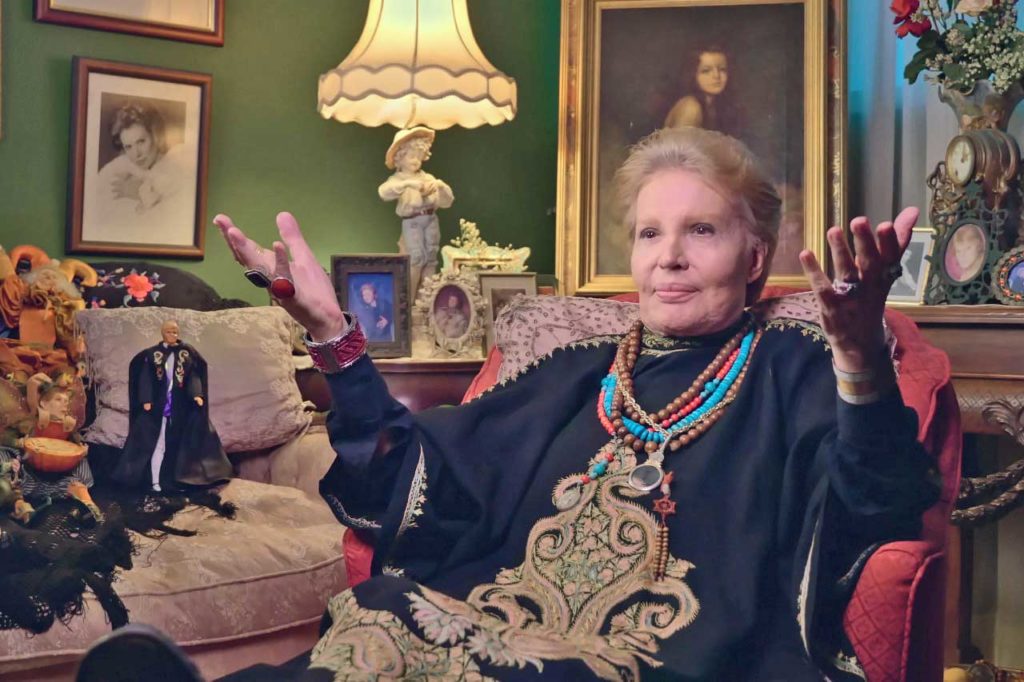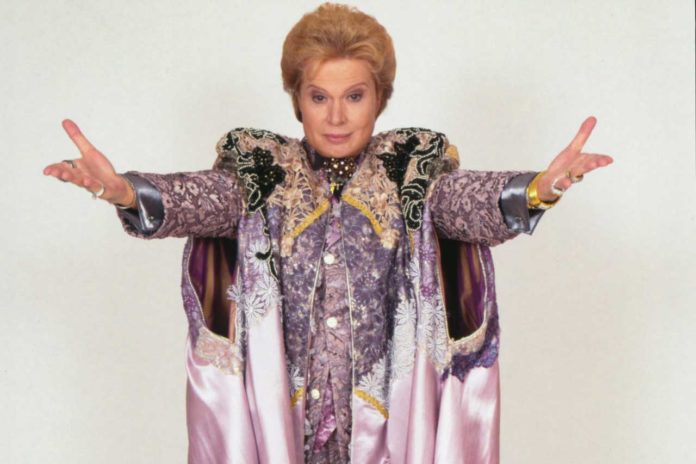Even if viewers are unfamiliar with Walter Mercado, the gender non-conforming, Puerto Rican astrologer, after seeing “Mucho Mucho Amor,” they will become fans. This entertaining documentary, premiering on Netflix July 8, showcases this irresistible, larger-than-life showman who became one of the most well-known psychics in the world and who imparted messages of faith, love, and peace.
The directors, Cristina Costantini and Kareem Tabsch, trace this unconventional celebrity in a pretty straightforward manner. Mercado was born in 1932 in the Puerto Rican countryside. He admittedly was “not like other boys.” His mother told him “being different is a gift,” and Mercado was, indeed, different. He gained some notoriety as a healer — “Walter of the Miracles,” he recounts being called — after helping a near-dead bird come back to life. Soon, people were flocking to him for healing.
Mercado’s popularity and fame really began to take shape when he was performing as an actor on a telenovela in the 1960s. When he was asked to do a segment about astrology, people immediately clamored for more. That quickly lead to “Walter, the Stars, and You,” a 1-hour program where Mercado read horoscopes. Mercado’s readings had many iterations over several decades, including segments on news shows, radio programs, and other outlets.

Mercado’s shows were upbeat, and featured fabulous, opulent capes and costumes. (One orange outfit he wore is described as if a pumpkin had swallowed him.) He used hand gestures, which he learned from studying dance, to make his presentations more dramatic. He was kitschy, but mesmerizing, and achieved tremendous success. And he ended every show with his signature phrase, “Mucho Mucho Amor.”
His impact was extraordinary. Not just for his positive messages but, as LGBT activist Karlo Karlo says in the film, for giving queer kids hope. There was something powerful about seeing a man with considerable female energy “breaking the rules” and being embraced in the macho and homophobic Latin community. Of course, Mercado was mocked in sketch comedy segments, but that somehow only reinforced his popularity and acceptance.
But Mercado does not speak about his sexuality or identity. “I have sex with life,” he admits in one interview. He also claims to be a virgin. Some describe him as asexual. Mercado’s assistant, Willy Acosta, interviewed in the film, says that he is often assumed to be Mercado’s partner/lover, but Acosta insists he has never touched his boss.
In addition, one talking head describes the astrologer’s augmented face as “defying gender and age.” When asked about having plastic surgery, Mercado confesses to having had Botox. “Little arrangements,” he calls it, “Like Nicole Kidman.” He also makes a Dorian Gray joke, and he has a framed picture of Oscar Wilde on one of his tables.
The mystery of Walter Mercado is perhaps more interesting than the truth, and that may be the key to his popularity. When Mercado “disappeared” for a spell, fans wondered what happened to the famed astrologer. Curiously, Mercado has had a resurgence among young fans. There is a cocktail named after him, a restaurant bathroom shrine dedicated to him, and he is the basis for many, many memes.
“Mucho Mucho Amor” concentrates on the love for Mercado which arguably reached its apex when Bill (Guillermo) Bakula, helped him get on the Psychic Friends Network. While money poured in from the trendy 900-line call-in service, the entire enterprise was considered by many to be a scam. Mercado defends his work, claiming he motivated callers.
However, it is Mercado’s business arrangements with Bakula that provide arguably the most interesting segment in the documentary. Entitled, “Wheel of Fortune,” it chronicles Mercado’s contract with Bakula that gave Bakula the rights to all of Mercado’s past and future work, as well as the performer’s name. When Bakula stopped paying Mercado — who was unaware of what the contract meant when he signed it — legal cases dragged out in the courts for six years.
The stress of the lawsuits likely caused Mercado health issues, and “Mucho Mucho Amor” shows how frail the astrologer becomes late in life. Despite having a cabinet of vitamins and claiming to be a 20-year-old in the body of someone who is “between 50 and death,” Mercado has back issues resulting from falls, and sciatic pain — especially when he dons a 15-pound cape for a photo shoot. Mercado passed away in November, 2019, at age 87.
But Costantini and Tabsch don’t dwell on the negative in their mostly celebratory portrait. In one of the most thrilling scenes, Mercado meets one of his biggest fans, Lin-Manuel Miranda, an episode so full of emotion (on Miranda’s part) that viewers will likely get goosebumps.
Likewise, when Mercado is the subject of an exhibit at the Miami History Museum in 2019, the love during a tribute night is palpable. Watching Mercado on a throne being feted by fans in an extravagant fashion is positively delightful.
“Mucho Mucho Amor” genuflects before its subject. The filmmakers’ awe and wonder are infectious.
